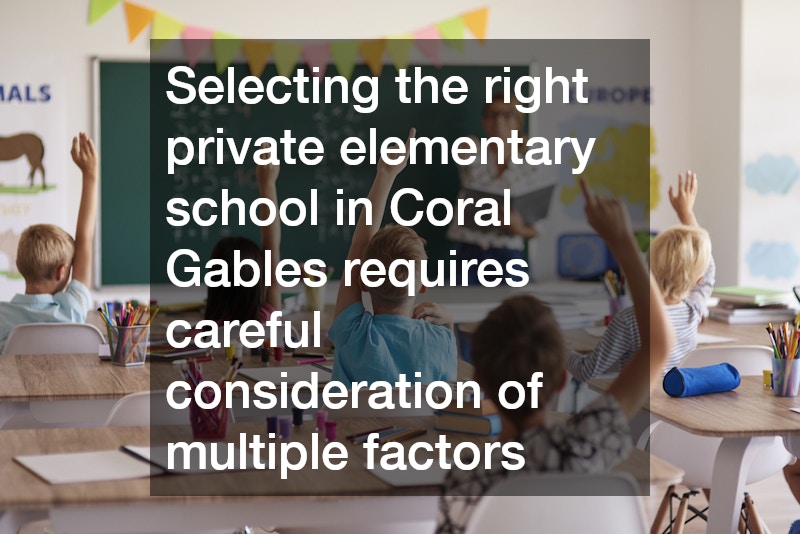Choosing the right private elementary school is one of the most significant decisions parents can make for their child’s education. Early education plays a crucial role in shaping a child’s academic foundation, social skills, and overall growth. The right school can nurture a child’s curiosity, encourage critical thinking, and provide a well-rounded learning experience. If you’re looking for a private elementary school in Coral Gables, there are several factors to consider, from curriculum and teaching methods to financial planning and community engagement. Here’s a comprehensive guide to help you find the best fit for your child.
What are the Key Factors to Consider When Choosing a Private Elementary School?
School Accreditation and Ratings
Accreditation ensures that a school meets high educational standards and follows best practices in teaching and administration. Check whether the school is accredited by recognized organizations such as the Florida Council of Independent Schools (FCIS) or AdvancED. Reviews and ratings from educational boards and parents can also provide insight into a school’s reputation.
Curriculum and Educational Philosophy
Different schools follow distinct educational philosophies, such as Montessori, Reggio Emilia, or traditional academic models. Determine which approach aligns best with your child’s learning style and future academic goals. A well-balanced curriculum should include core subjects like math, science, and language arts, as well as enrichment programs such as music, art, and foreign languages.
Teacher Qualifications and Student-Teacher Ratio
The quality of teachers significantly impacts a child’s learning experience. Look for schools where teachers hold relevant degrees and certifications in education. Additionally, a low student-teacher ratio ensures that children receive individualized attention and support, which is crucial for academic success.
Extracurricular Activities and Facilities
Beyond academics, a well-rounded education includes extracurricular opportunities such as sports, music, drama, and STEM programs. Schools with modern facilities, well-equipped libraries, and safe playgrounds contribute to a child’s overall development. Check if the school encourages participation in clubs, competitions, and community service projects.
Proximity and Transportation Options
Consider how close the school is to your home or workplace. A long commute can be tiring for young children and impact their daily routine. If transportation is a concern, check if the school offers bus services or carpooling options.
How to Evaluate the School’s Environment and Culture?
School Visits and Tours
A physical visit provides firsthand insight into the school’s environment. Observe how students interact, the condition of classrooms, and the overall atmosphere. Many schools offer open houses or private tours to help parents assess the learning spaces and teaching styles.
Parent and Student Feedback
Speak to other parents and students to get an honest perspective on the school’s strengths and weaknesses. Online forums, parent testimonials, and school review websites can also offer valuable insights.
Community Inclusivity and Diversity
A school that values diversity fosters an inclusive learning environment where students from different backgrounds feel welcome. Consider schools that promote multicultural awareness, respect, and global-mindedness.
Discipline Policies and School Safety
Every school has a different approach to discipline and student behavior management. Review the school’s policies on bullying prevention, conflict resolution, and student conduct. Additionally, check the security measures in place, such as controlled access to school premises and emergency preparedness plans.
School’s Mission and Values Alignment
A school’s mission statement reflects its educational philosophy and priorities. Choose a school whose values align with your family’s beliefs and expectations regarding academic rigor, character development, and social responsibility.
What are the Financial Considerations and Assistance Available?
Tuition Fees and Payment Plans
Private school tuition varies widely, so it’s essential to evaluate the cost and payment options. Some schools offer flexible payment plans to make tuition more manageable.
Scholarships and Financial Aid
Many private schools provide scholarships and need-based financial aid to families who qualify. Check with the school’s financial office to learn about available assistance programs.
Additional Costs (Uniforms, Books, etc.)
Beyond tuition, there may be additional expenses for uniforms, textbooks, school supplies, field trips, and extracurricular activities. Consider these costs when planning your budget.
Fundraising and Volunteer Expectations
Some schools require parents to participate in fundraising efforts or contribute volunteer hours. Understand these expectations before committing to a school.
Budgeting for Long-Term Education Investment
Since your child’s education is a long-term commitment, plan financially for elementary school through high school. Consider how tuition increases or changes in financial aid policies may impact your budget in the coming years.
Selecting the right private elementary school in Coral Gables requires careful consideration of multiple factors, from accreditation and curriculum to financial planning and community involvement. A well-chosen school can provide a strong academic foundation while fostering personal growth, creativity, and social development. Visiting schools, gathering feedback from parents and students, and aligning your choice with your child’s unique needs and values will help ensure a positive and enriching educational experience. By taking the time to research and prioritize what matters most, parents can make an informed decision that supports their child’s success both in and out of the classroom.
.

















